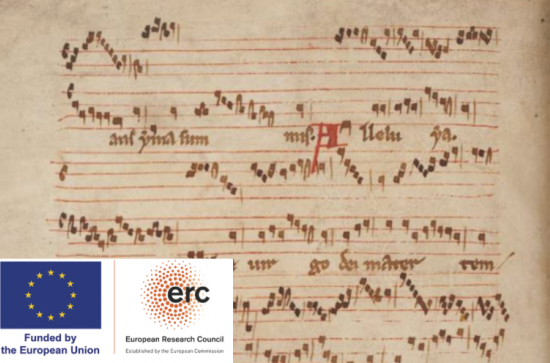
Applications are invited for two four-year fully funded, full-time doctoral studentships, commencing 1 July 2024. The PhD students will be based at the Department of Music in Maynooth University, Ireland, as part of Professor Karen Desmond’s research team working on the project ‘Polyphonic Singing and Communities of Music Writing in Medieval Britain and Ireland, c. 1150 to c. 1350’ (BROKENSONG) (funded by a 5-year European Research Council Consolidator Grant). Professor Desmond will supervise both PhD theses. The funding covers tuition fees and offers a generous living stipend for four years. First consideration will be given to applications submitted before 15 March 2024.
The BROKENSONG project examines polyphonic singing in medieval Britain and Ireland during a transformative period of western music history, c. 1150-1350, when written books devoted to polyphony began to proliferate across Europe. Using methodologies from musicology, music analysis, medieval and manuscript studies, practice-based research, and digital humanities, BROKENSONG aims to answer the principal research question: What does it mean for a culture to write its music down? BROKENSONG investigates what this act of ‘writing-down’ meant to and for musical communities. The insular sources extant from this period—just over a hundred mostly fragmentary sources—hint at stories of music practice and creation different from those suggested by the highly curated continental anthologies of polyphony that survive from continental Europe, and around which the history of western music was written. The insular sources are mostly broken books transmitting broken songs: yet BROKENSONG proposes that its in-depth study of these fragmentary and damaged manuscripts will provide a breakthrough on fundamental questions regarding the relationship between music’s materialculture—its books and its technologies of music writing—and processes of music creation in the later Middle Ages. It will reconstruct a lost vibrant musical culture, contextualizing these remnants of music writing and practice within specific music communities.
Three intersecting phases of the project reconstruct the fragmentary material artifacts, develop historical understandings of music and community, and analyse communities of musical style through a combination of practice-based and computational approaches.
The first prospective doctoral student (PhD student 1) will primarily work on the phase of the project titled ‘Contexts, communities, and networks’, which explores the meaning of music writing with a focus on the question: who was using music writing, either to write down or read music, and why? This project phase focuses on the case study of Worcester Cathedral: Worcester makes a particularly valuable case study for the study of music writing and its meaning for communities due its rich potential for archival and prosopographical research, its extensive medieval library, and its collection of liturgical books and fragments. This PhD student will conduct research trips to Worcester in the United Kingdom to examine the contents of Worcester’s medieval library—particularly the library’s outstanding sermon collections and Marian treatises—for the resonances that those texts have with the texts of Worcester’s polyphonic and monophonic compositions. This PhD student will primarily focus on the unique manuscript known as the Worcester Antiphoner (Worcester Cathedral Library, MS F. 160), one of the most important liturgical books to survive from medieval England, and also study the earlier liturgical manuscripts extant from Worcester, and the large number of plainchant fragment leaves related to Worcester Cathedral. The student will write their PhD thesis on Worcester Cathedral’s plainchant and liturgy.
The second prospective doctoral student (PhD student 2) will primarily work on the two other phases of the project, which are titled ‘Reconstructing the repertoire’ and ‘Music writing, style, and community’ respectively. In ‘Reconstructing the repertoire’ the musical content on the insular fragmentary and damaged sources c. 1150-1350 will be recovered and reconstructed using techniques such as MSI, palaeographical methods, music encoding, and music analysis. The primary output of this phase is an innovative ‘born-digital’ scholarly edition that will present interactive reconstructions of these works alongside the enhanced manuscript images for use by scholars and performers, providing an exemplar for future digital music editions, which integrates image, sound, encoding, and context, and PhD student will contribute editions and reconstructions of music compositions. In ‘Music writing, style, and community’ the research team will work to understand the relationship of notational systems and musical style to specific regions, repertoires, communities, and individuals through computer-based analysis activities and performance-based analysis activities. This second PhD student will write a PhD thesis on the analysis of networks of musical style in insular polyphony.
PhD Student 1 will be a medievalist or musicologist, with a Bachelor’s, or preferably a Master’s, degree in medieval studies/history, medieval Latin, liturgy and theology, and/or plainchant. Preference will be given to candidates demonstrating competence in Latin and music notation.
PhD Student 2 will be either be a music, digital humanities, or computer science graduate with interests in music, or a scholar-performer specializing in medieval vocal improvisation (plainchant or polyphony). They will have a Bachelor’s or Master’s degree in a relevant field and research interests in the analysis of humanities data. Preference will be given to candidates who have expertise in either computational approaches to the analysis of music, image, or text content, or performance-based analysis of early music including improvisation and practice-based research.
Informal enquiries are welcomed and should be directed to Professor Karen Desmond, Professor of Music, Maynooth University, at [email protected]. First consideration will be given to applications submitted before 15 March 2024.
Applications should be made through PAC. Three documents should be uploaded with the application: Three documents should be uploaded with the application: 1) a cover letter, 2) curriculum vitae, and 3) a 1-2 page research proposal (single-spaced, roughly between 1,000-2,000 words).
For a downloadable PDF of the above details, please click this link: PhD Studentships BROKENSONG
